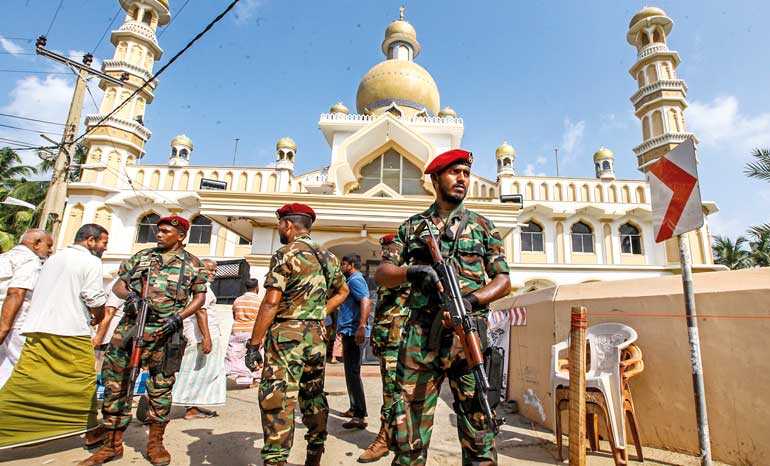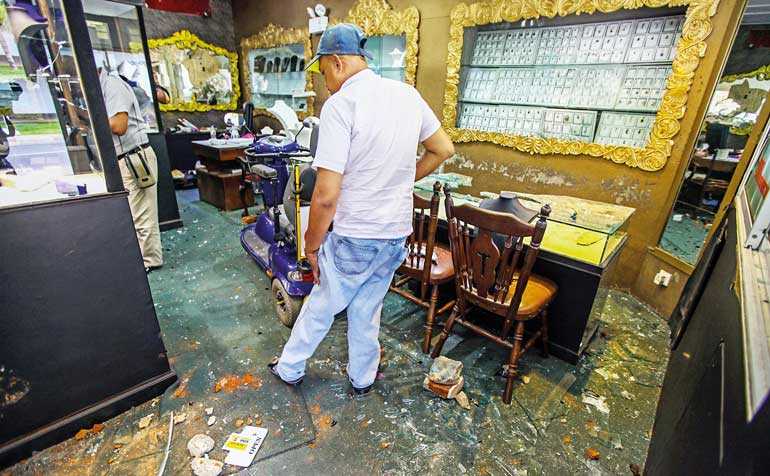Monday Mar 02, 2026
Monday Mar 02, 2026
Tuesday, 12 November 2019 00:00 - - {{hitsCtrl.values.hits}}

Armed personnel stand guard outside a mosque in Negombo. Sri Lanka’s madrassas have come under scrutiny after Sri Lankan nationals who claimed links to Islamic State carried out coordinated suicide bombings on Easter Sunday that killed more than 250 people

A Muslim man stands inside his destroyed shop after a mob attack
By Marwaan Macan-Markar
Nikkei.com: Muslim religious leaders are ramping up warnings about the danger of Islamic extremists in Kattankudy, a densely packed Muslim town along Sri Lanka’s eastern coast, in sermons delivered during weekly Friday afternoon prayers.
“The sermons against radicalisation are new; they have not focused on this topic before,” said Mohamed Abdul Careem Mohamed Jawahir, Director of the nonprofit Federation of Civil Society Organisations in Kattankudy. “It is making the entire community more vigilant about radicalisation.” The federation focuses on cultivating religious co-existence.
The killing of Abu Bakr al-Baghdadi, the leader of the Islamic State group, in Syria by US Special Forces on 26 October has been greeted with relief by local residents and also the All Ceylon Jamiyyathul Ulama, a national body of Islamic theologians, which welcomed the operation against “an absolutely deviant organisation”.
Sri Lanka’s Muslim community, which accounts for just 10% of the population in the largely Buddhist country, has been under siege after a wave of suicide bombings on Easter Sunday in April this year killed more than 250 people and injured 500. That was the worst terror attack in Sri Lanka since a near-30-year civil war ended in May 2009, which was waged between Government troops and the separatist Tamil Tigers.
The perpetrators were the first homegrown suicide bombers from the Muslim community. Mohamad Cassim Mohamed Zaharan, the ringleader, and four family members involved in the attack came from Kattankudy.
A chilling video of Zaharan released shortly after the attack said that Islamic State group claimed responsibility for the attacks. But investigations since then raised questions about any direct link between Sri Lankan Muslim extremists and the Islamic State group.
The attacks triggered a backlash against Muslims in some pockets of the country, led by organised mobs from the majority Sinhalese community. The Sinhalese trace their history to northern India, while the Tamils, the largest minority, have roots in southern India.
“The Easter attacks breathed new life into an anti-Muslim campaign that Sinhalese nationalists had been waging since 2011,” said the International Crisis Group, a Brussels-based think tank, in a September report that pointed to “large-scale rioting against Muslims, with nationalist organisations bussing in supporters and mobilising local Sinhalese”.
Not surprisingly, Kattankudy’s connection to the ringleader Zaharan has put madrassas – Islamic religious schools – in the town and in other Muslim communities under scrutiny by the country’s national security forces. Zaharan was thought to have built a following through such Muslim religious schools by preaching extremism.
Kattankudy and other towns in the east, also home to high concentrations of Muslims, have been a battleground between the new wave of religious leaders preaching an extremist brand of the faith and leaders who advocated a traditional, moderate version. Tension, at times leading to clashes, has been rife since 2006, with the extremists always coming out on top.
Moderate Muslims had raised the alarm about the mushrooming madrassas that preached intolerance for years. “In the East many had been set up by moulavis [Muslim religious teachers] who had come from India and Pakistan and had married local women,” said Shreen Saroor, a leading Muslim women’s rights activist. “I saw this trend in the last five years, when they enforced change to local Muslims with their intolerant attitudes.”
Hilmy Ahamed, Vice President of the Muslim Council of Sri Lanka, a civil society network, said that Muslims must face up to the extremism that has taken root in their midst. “We have a huge problem with mushrooming madrassa education where no set curricula are followed,” he said.
“Different ideological groups like the Thablighi movement and the recent Thowheed groups are teaching their brand of Islam.” The Thablighi movement is an Islamic missionary organisation that tries to enforce rigid religious rules, while the National Thowheed Jamat is a break-away faction of a militant Muslim group in Sri Lanka.
Zaharan tapped into this toxic religious environment to build his network. According to Sri Lankan intelligence sources, Zaharan’s network had been targeting young men to attend religious youth camps since 2014.
“The attendees who showed skill and interest were then invited to attend a second, smaller camp, after which the cream of this crop was taken to attend a final, advance course,” said an intelligence source. “The last session was over two weeks where the focus was on religious ideology and they were taught how to dismantle and reassemble a gun.”
Some of these accounts have come to light from the 300 Muslims still in custody after over 1,800 men and a few women were arrested following the attacks.
The Sri Lankan Government has also warned against the spread of Wahhabism, a strand of Islam practised in Saudi Arabia, which some analysts say has fuelled the rise of extremism.
Other political commentators said that the internet must also be monitored as a breeding ground for extremism. “The germ of violent extremism has spread through the internet, and you cannot say radicalisation only spreads through schools,” said Javed Yusuf, a respected Muslim political commentator. “The Government needs to be sensitive in handling this and not make the Muslims feel they are being targeted.”
- Pix by Chamila Karunarathne